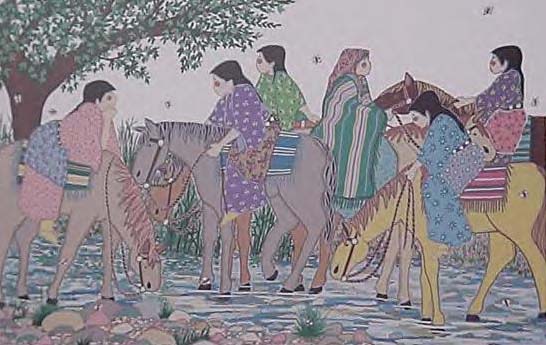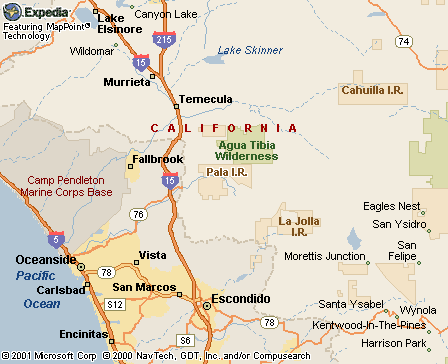|
|
Canku Ota |
|
|
(Many Paths) |
||
|
An Online Newsletter Celebrating Native America |
||
|
January 26, 2002 - Issue 54 |
||
|
|
||
|
Cultural Traditions Revived in Poetry |
||
|
by Jamie Francisco North
Country Times-January 20, 2002
|
||
|
art: Sisterhood
by Virginia Stroud
|
|
PALA INDIAN RESERVATION ---- In the poetry of Vivian Banks Charter School students, similar themes resonate ---- a respect for nature and childhood memories infused with cultural traditions. For three years, all the students in the Bonsall Union Elementary School District have been receiving writing lessons from Ross Talarico, an award-winning author specializing in oral histories. The lessons give Vivian Banks students an avenue to share their experiences about growing up on the reservation and allow them to describe what it means to be American Indian or Mexican-American. Of the 130 students who attend Vivian Banks, about 43 percent are American Indian and 56 percent are Latino. Most students do not know how to speak the language of their American Indian ancestors, acting Principal Pat Tippit said. The Luiseno and Cupeno bands were removed from their home in Warner Springs and brought to the Pala reservation in 1903. "They have lost some of their culture, so it's important for them to connect with who they are," Tippit said. During his lessons, Talarico writes key words and phrases on the board to guide students. Fifth-grader Isaias Vazquez said Talarico's lessons helped him boost his vocabulary and inspired him to improve the imagery in his poems, he said. Talarico, 52, is an Italian-American whose work with minority communities has been featured on NBC's "Today Show" and National Public Radio's "Weekend Edition." "He describes things; he gives us more words and details," Isaias said. "I get more ideas." Ten-year-old Danielle Barrett said the lessons make her reflect on the history of American Indians and cultural traditions she celebrates today. She uses these images in her poems during the writing lessons, she said. "It helps us remember the past," Danielle said. "It helps me think about stuff that I've done in the past, what's happened." In their poems, students address issues of gender, racism and prejudice, Talarico said. Talarico has recorded the oral histories of minority populations throughout the nation. He has found that people who live in poverty and confront prejudice in their daily lives draw upon these experiences in their writing, he said. The poetry of Vivian Banks students reflects their appreciation for nature and the issues they deal with on and off the reservation, he said. "Sometimes it's easier with people with difficult lives to write more effectively about things that matter," said Talarico, who has won several literary awards and been honored for his poetry. Talarico is compiling student poems and oral histories from Pala elders that will be published in a textbook this spring. The collection will provide a historical record of reservation life for generations to come, district officials said. "When an old person dies, it's like a library burning down," Talarico said. Booklets featuring student poems and oral histories have already been distributed to parents and students, with some teachers using them as class materials. District officials approached tribal members several years ago to ask them what they could do to help preserve their cultural history and incorporate lessons about tribal traditions into the school's curriculum, said Leroy Miranda Jr., director of the Cupa Cultural Center, the reservation's historical center. The poems and oral histories illustrate parallels between the young and the elders. Life on the reservation has changed, but modern life has not altered the beauty and nature of Pala, he said. "Any documentation of our history, of the elders, is really for our future generations," Miranda said. "It really gives a glimpse of our past, and it shows our children haven't changed that much." The district hired Talarico in 1999 as part of an Academic Volunteer and Mentor Service Program grant that is offered by the state. The $300,000 grant ends in the spring, but Talarico will continue giving writing lessons and collecting oral histories. Board member Sylvia Tucker recruited Talarico because of his experience in collecting oral histories. The oral histories may end up becoming part of Vivian Banks' curriculum, Tucker said, adding that Talarico's efforts have produced stories that might otherwise have been limited to family circles, she said. "I think the stories that Ross did probably would never have been told," Tucker said. "I think that would've been a shame, and we intend to do more." Teacher Virginia Leighton said Talarico's lessons have boosted students' self-confidence, which has carried over into other academic areas. The poems give students an opportunity to share their unique experiences, she said. "He always references family legends and stories, which helps them to get started," Leighton said. "He speaks about their family history because he knows them."
|
|
|
||
|
|
||
| Canku Ota is a free Newsletter celebrating Native America, its traditions and accomplishments . We do not provide subscriber or visitor names to anyone. Some articles presented in Canku Ota may contain copyright material. We have received appropriate permissions for republishing any articles. Material appearing here is distributed without profit or monetary gain to those who have expressed an interest. This is in accordance with Title 17 U.S.C. section 107. | ||
|
Canku Ota is a copyright © 2000, 2001, 2002 of Vicki Lockard and Paul Barry. |
||
|
|
|
|
|
The "Canku Ota - A Newsletter Celebrating Native America" web site and its design is the |
||
|
Copyright © 1999, 2000, 2001, 2002 of Paul C. Barry. |
||
|
All Rights Reserved. |
||


